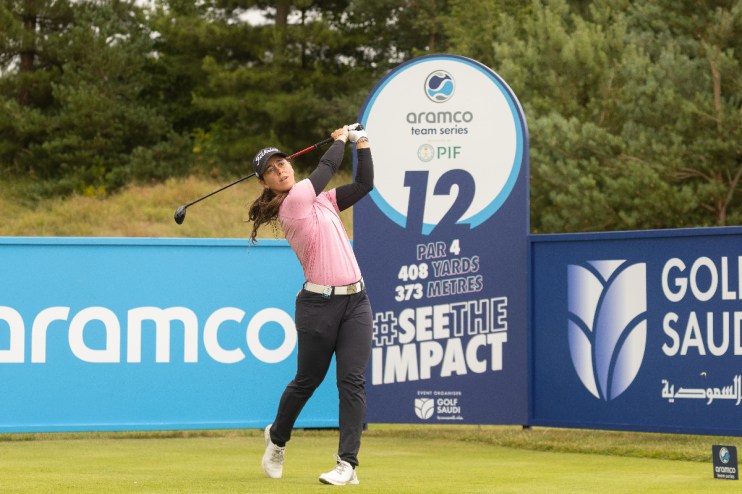Driving Growth: How Golf Saudi’s Aramco Team Series is Connecting Golf with Business

It is a golf competition unlike any other, where amateurs get the chance to compete alongside professionals, play on three continents, and win big. In this year’s Aramco Team Series, a total of thirty-six teams of four, each consisting of three professional players and one amateur, are battling it out for a prize fund worth $5 million. A total of five tournaments, or “rounds”, are taking place at venues across the world, including Tampa Bay, Shenzhen and Riyadh. The series, which is an extension of the Ladies European Tour, promises to transform the world of women’s professional golf as profoundly as LIV Golf is shaking up the men’s game.
The playing format is not the only remarkable feature of the Aramco Team Series, however. Underpinning the tournament is Golf Saudi’s commitment to providing an environment in which business and golf can easily connect and enhance the global game. It was in this spirit that the Third Round of the Aramco Team Series teed off in the spectacular surroundings of the Centurion Club in rural Hertfordshire earlier this month. The opening day was attended not only by an impressive group of female professional golfers, but also by a host of CEOs and executives from Golf Saudi and Saudi Arabia’s Public Investment Fund.
The Kingdom of Saudi Arabia’s soaring ambitions for global golf were outlined by Golf Saudi’s representatives. They explained that the main purpose of the Aramco Team Series is to leave a social, environmental and economic impact in every country in which the series is played. In doing so, Golf Saudi hope to inject fresh energy and ideas into both the game of golf and the industry surrounding it. Crucially, they are also seeking to invest in creating new opportunities for golfers, and especially female golfers.
The general air of excitement at the Centurion Club was echoed by one of the professionals playing in the Series, Aline Krauter of Germany. Krauter praised Golf Saudi for opening up new opportunities for female professionals: “I think what the Saudis have done for the European Tour has definitely elevated it immensely. They are definitely elevating the women’s game and I think they will further elevate the women’s game.” She added: “I think they are very invested in sports in general and they are willing to do something, which is what women’s golf really needs to get a bigger stage and find people who are willing to invest.”
The pioneering success of Golf Saudi’s Aramco Team Series is just one expression of a broader shift taking place in the Kingdom of Saudi Arabia. The willingness of the Saudi Public Investment Fund (PIF) to finance innovative new playing formats and champion women’s golf is part of the remarkable socio-economic transformation taking place within Saudi Arabia in the wake of the Vision 2030 reform programme announced in 2016.
The opportunities that exist for British businesses to invest in the extraordinary economic expansion of Saudi Arabia’s non-oil economy were emphasised by one of the attendees at the Centurion Club, Richard Gray, the Vice Chairman of Invescore. Gray, who has helped several non-Saudi companies to establish operations in the Kingdom of Saudi Arabia, believes that events like the Aramco Team Series have the potential to forge connections between investors in the City of London and the Saudi market.
Gray highlighted how “the market in Saudi is growing exponentially, with huge international interest in the key drivers in the domestic economy.” He also outlined several key areas where British companies excel and have become increasingly aware of “the vast potential that exists in Saudi Arabia”, such as in professional services, construction, technology, healthcare and media.
An after-golf dinner at the Centurion Club was rounded off by two Elevated Green panel events organised by the FII Institute, a global non-profit foundation run by Saudi Arabia’s PIF. The panels gathered high-profile executives working in Saudi Arabia and the United Kingdom to discuss recent economic developments in the Kingdom of Saudi Arabia and beyond.
Speaking on the first panel, Sir Martin Sorrell, Executive Chairman at S4 Capital, identified geopolitical fragmentation and technological change as the key axes reshaping the global economy.
Noel Quinn, the Chief Executive of HSBC Group, argued that Saudi Arabia’s economic diversification is driving a rapid reconfiguration of global trade patterns, but urged that this should be viewed as an opportunity rather than a threat.
Turning to the vital role played by international capital in Saudi Arabia’s economic transformation, Jerry Todd, the Head of National Development at the PIF, emphasised the importance of various types of capital in driving continued growth and diversification. Human, intellectual and financial capital flows into the Kingdom will all be needed to sustain the spectacular rise of Saudi Arabia’s non-oil economy.